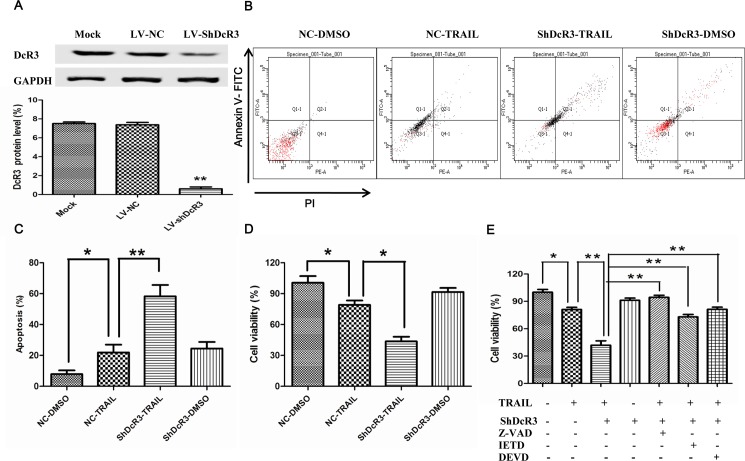Evidence has proven that almost all hepatocellular carcinoma (HCC) cells are immune to tumor necrosis issue (TNF)-related apoptosis-inducing ligand (TRAIL)-mediated apoptosis.
However, the molecular mechanisms underlying TRAIL-mediated apoptosis resistance aren’t nicely understood. In this research, we reported that downregulation of Decoy receptor 3 (DcR3) expression by lentiviral vectors carrying shRNA towards DcR3 (LV-ShDcR3, shDcR3) in Huh7 each vastly enhanced TRAIL-mediated apoptosis and diminished cell proliferation functionality.
In addition, silencing DcR3 resulted in upregulation of the cell apoptotic regulators together with Bid, caspase-3, and caspase-8. Caspase inhibitors inhibited shDcR3-mediated cell loss of life, which indicated that downregulation of DcR3 expression in Huh7 cells elevated TRAIL-induced caspase-dependent apoptotic cell loss of life.
Furthermore, though the knockdown of DcR3 altered the expression of some Bcl-2- and IAP-family proteins, this modification was inhibited by pretreatment with a pancaspase inhibitor, which indicated the cytotoxic impact of shDcR3 was not as a result of expression of those proteins.
In distinction, shDcR3 considerably inhibited TRAIL-induced transcription issue nuclear κB (NF-κB) activation by way of the IκB kinase (IKK) pathway, in addition to inhibited TRAIL-induced will increase in FLICE-inhibitory protein lengthy kind (cFLIPL) expression on the transcriptional stage. Silencing cFLIPL expression mimicked the cytotoxic impact of shDcR3 on TRAIL-mediated cell apoptosis.
Moreover, overexpression of cFLIPL successfully prevented the rise in cell apoptosis in Huh7 cells co-treated with TRAIL and shDcR3. Taken collectively, our findings indicated that silencing DcR3 sensitizes TRAIL-mediated apoptosis in HCC cells by inhibiting NF-κB.

Apoptosis as a Prognostic Factor in Colorectal Carcinoma: Comparison of TUNEL Method and Immunohistochemical Expression of Caspase-3.
The growth of colorectal most cancers is thought to be characterised by a sequence of occasions throughout which regular colonic epithelium progressively transforms to carcinoma, the adenoma-carcinoma sequence. Apoptosis performs an vital function within the growth and upkeep of tissue homeostasis. Currently, there is no such thing as a settlement within the literature in regards to the prognosis of apoptosis in colorectal most cancers.
The variety of research analyzing the expression of caspases in colorectal most cancers could be very restricted, they usually haven’t examined any correlation between expression and affected person survival. This research included histologic samples from 179 sufferers recognized with colon most cancers.
We used the TdT-mediated X-dUTP nick finish labeling methodology and caspase-Three labeling to establish the diploma of apoptosis. Our outcomes present that decrease apoptotic index measured by TdT-mediated X-dUTP nick finish labeling methodology and decrease immnuhistochemical expression of caspase-Three is related to shorter disease-free survival and general survival. However, solely apoptotic index is confirmed to be an impartial survival indicator.
The outcomes of our research are in line with the proposed fashions of carcinogenesis of colorectal most cancers that emphasize resistance to apoptosis as a decisive issue within the development of the illness and resistance to remedy.
